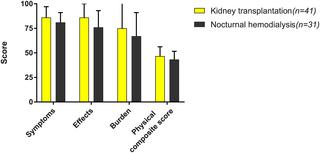PLOS ONE ( IF 2.9 ) Pub Date : 2018-09-20 , DOI: 10.1371/journal.pone.0204405 Thijs T. Jansz , Anna A. Bonenkamp , Franciscus T. J. Boereboom , Franka E. van Reekum , Marianne C. Verhaar , Brigit C. van Jaarsveld

|
Background
Health-related quality of life (HRQOL) is an important outcome measure in patients with end-stage renal disease. HRQOL is assumed to improve with kidney transplantation and also with nocturnal hemodialysis compared to conventional hemodialysis. However, there is no evidence regarding HRQOL to support the optimal treatment choice for patients on nocturnal hemodialysis who hesitate opting for transplantation. We therefore compared HRQOL between patients who were treated with kidney transplantation or nocturnal hemodialysis for one year.
Methods
We assessed HQROL using the Kidney Disease Quality of Life–Short Form questionnaire in a cross-sectional sample of patients who were treated with kidney transplantation (n = 41) or nocturnal hemodialysis (n = 31) for one year. All patients on nocturnal hemodialysis were transplantation candidates. Using linear regression, we compared HRQOL between kidney transplantation and nocturnal hemodialysis, and adjusted for age, sex, dialysis duration, cardiovascular disease, and presence of residual urine production.
Results
At one year follow-up, mean age of the study population was 54 ±13 years, and median dialysis duration was 3.2 (IQR 2.1–5.0) years. Kidney transplantation was associated with significantly higher HRQOL on the domain “effects” compared to nocturnal hemodialysis (adjusted difference 12.0 points, 95% CI 3.9; 20.1). There were potentially clinically relevant differences between kidney transplantation and nocturnal hemodialysis on the domains “burden” (adjusted difference 11.1 points, 95% CI -2.6; 24.8), “social support” (adjusted difference 6.2, 95% CI -6.6; 19.1), and the physical composite score (adjusted difference 3.0, 95% CI -2.0; 8.1), but these were not significant.
Conclusions
After kidney transplantation, HRQOL is especially higher on the domain “effects of kidney disease” compared to nocturnal hemodialysis. This can be useful when counseling patients on nocturnal hemodialysis who may opt for transplantation.
中文翻译:

肾脏移植和夜间血液透析之间与健康相关的生活质量比较
背景
与健康相关的生活质量(HRQOL)是终末期肾脏疾病患者的一项重要结局指标。与传统的血液透析相比,HRQOL被认为可以通过肾脏移植以及夜间血液透析得到改善。但是,没有证据表明HRQOL支持为夜间血液透析患者犹豫选择移植的最佳治疗选择。因此,我们比较了接受肾脏移植或夜间血液透析治疗一年的患者之间的HRQOL。
方法
我们使用肾脏疾病生活质量(简表)问卷评估了接受肾脏移植(n = 41)或夜间血液透析(n = 31)治疗一年的患者的横断面样本中的HQROL 。夜间进行血液透析的所有患者均为移植候选者。使用线性回归,我们比较了肾脏移植和夜间血液透析之间的HRQOL,并针对年龄,性别,透析时间,心血管疾病和残余尿量进行了调整。
结果
在一年的随访中,研究人群的平均年龄为54±13岁,中位透析时间为3.2(IQR 2.1–5.0)年。与夜间血液透析相比,肾脏移植与域“效应”上的HRQOL显着更高(调整后差异为12.0点,95%CI 3.9; 20.1)。肾脏移植和夜间血液透析之间在“负担”域(调整后的差异为11.1分,95%CI -2.6; 24.8),“社会支持”(调整后的差异6.2,95%CI -6.6; 19.1)之间可能存在临床上相关的差异。 ,以及身体综合得分(调整后的差异3.0,95%CI -2.0; 8.1),但这些差异并不显着。
结论
肾脏移植后,与夜间血液透析相比,HRQOL在“肾脏疾病的影响”领域尤其高。当为可能选择移植的夜间血液透析患者提供咨询时,这可能会很有用。











































 京公网安备 11010802027423号
京公网安备 11010802027423号